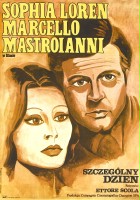Szczególny dzień
Una giornata particolare
1977
- podstawowe informacje
- Opinie i Nagrody
- multimedia
- pozostałe
powrót do forum filmu Szczególny dzień
Michel Drucker
Yes it's her, Antonietta, Sophia Loren, what a difference to the programme. Firstly a thousand
thanks for having accepted this interview, Sophia Loren. I believe that it's the first time that you
have agreed to a French television interview, as televised interviews are not your favourite
pastime.
Sophia Loren
No it's not that they are not my favourite pastime, it's because when I shoot a film, I always feel
protected by the character that I play. And when I'm in front of a television camera I feel a bit
more exposed, than when I make a film, when I play a character in a film.
Michel Drucker
In an case in this role of Antonietta, heroine with Marcello Mastoianni of "A special day", you
couldn't say that you were able to hide behind make up. There you were truly "naked", if I dare
say.
Sophia Loren
Not at all, because really you have discussed the character a lot with the director Ettore Scola,
and he's a director that I find very sensitive and very intelligent. And I consider him as one of the
three or four most important Italian directors, and I'm in debt to his talent and gentle but firm
manner, for having understood and overcome all the difficulties of the character. And so I
appear in front of the camera with no make up, with a little dressing gown, with slippers with a
hole in,
Michel Drucker
And spun yarn stockings?
Sophia Loren
And spun yarn stockings, completely removed.
Michel Drucker
But is it psychologically easier for the actress to act without any make up, without effects, for the
emotion that's perhaps easier?
Sophia Loren
That depends on the role that you're doing. If you are play glamour roles as they say in America,
Michel Drucker
Very good?
Sophia Loren
No not at all, but if you are playing a normal woman, it helps a lot because really I am a normal
woman myself, I have a modest background, I feel really at home and I feel I am close to my
roots and I feel totally at ease.
Michel Drucker
You were a very little girl,
Sophia Loren
Of course I must forget my little womanly vanities,
Michel Drucker
Yes, of course. Sophia Loren, you were a very little girl in 1938, the day when Hitler came to visit
Mussolini, and the whole family went to the parade, I'll come back to that in a moment. And you
didn't have the political maturity to understand the events of the time, your mother perhaps did
that for you, but it is within that social context of the time, you were the little girl of the people, did
fascism say mean something for you, when you were growing up, did it mean something
important?
Sophia Loren
What I remember of that time, was real hunger, misery, cold, I had no shoes, I had no clothes to
put on, and I will never be able to forget that. And really now that I have a bit of money, the first
thing that I do is, I buy shoes, lots of shoes. Because really that was a desperate moment for me.
Michel Drucker
Does your mother resemble this Antonietta from 1938, this enslaved mother of a family,
dominated by a tyrannical man, as many men were at that time and still are too?
Sophia Loren
No not at all, because my mother was never married to my father.
Michel Drucker
She was what you called a ragazza madre, is that it?
Sophia Loren
Ragazza madre, a girl-mother, she was maybe one of the first hippies of that time, she was an
artist, an intellectual, she played the piano very well, she was a very beautiful woman, She
wasn't like Antonietta at all. I could be a bit more like Antonietta, I'm a bit closer to Antonietta.
Michel Drucker
That's not very nice for your husband Carlo Ponti?
Sophia Loren
No, it's not because of that, it's to do with feelings that you feel inside yourself. It's not about
relationships with men.
Michel Drucker
So let's just talk about relationships with men, Antonietta's husband, a fascist of course, is truly a
despicable person par excellence, who tyrannises everyone, who ill-treats, who has extremely
violent relationships with the members of his family. You see it in this scene, we're not talking
any more about fascism, are there still men like that in Italy?
Sophia Loren
But it's not only men like that who exist, there are also women like that in the world today. And
men like my husband in the film unfortunately still exist, men who are real men, who believe
they are real men, Very manly as a good fascist should be, and within their masculine universe,
the woman is always treated like, I don't know
Michel Drucker
A slave,
Sophia Loren
A maid who has to do everything,
Michel Drucker
A housewife, yes,
Sophia Loren
Like a pathetic being without any right to participate in the important problems in society.
Michel Drucker
Moreover it is noted that Antonietta does not go to the parade, she stays at home to do the
housework.
Sophia Loren
Yes because that's the only thing that she can do.
Michel Drucker
We are now going to talk, as the extract will give us the opportunity, about Marcello Mastroianni.
It was your ninth encounter with Marcello, is he more than a family friend now?
Sophia Loren
Ah yes! He is a brother, he's a husband, he's everything.
Michel Drucker
Who is he in this film, he is someone who has a difficult life, he doesn't attend the parade,
neither do you, does he not attend for other reasons?
Sophia Loren
Because he's homosexual.
Michel Drucker
Therefore rejected by the regime.
Sophia Loren
At that time, I was told that homosexuals couldn't take part in social life, they were sent to
confinement
Michel Drucker
Concentration camps.
Sophia Loren
Exactly, so that's Marcello's character in the film.
Źródło: Les rendez-vous du dimanche


